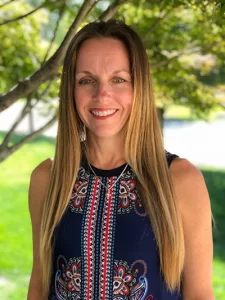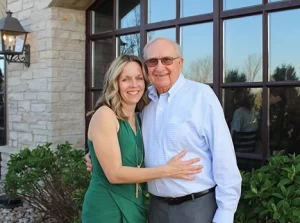 November can be a time for s’mores, warm hoodies and crisp air. For me, it’s also a time to reflect, educate, recognize and honor the more than 53 million unpaid caregivers in the U.S. These individuals passionately support family (89% of those caring for adults are taking care of a relative), friends and community members. More than a quarter (27%) of them are helping someone with a mental health challenge (Mental Health America, n.d.). So, this November, please join me in celebrating National Family Caregivers’ month.
November can be a time for s’mores, warm hoodies and crisp air. For me, it’s also a time to reflect, educate, recognize and honor the more than 53 million unpaid caregivers in the U.S. These individuals passionately support family (89% of those caring for adults are taking care of a relative), friends and community members. More than a quarter (27%) of them are helping someone with a mental health challenge (Mental Health America, n.d.). So, this November, please join me in celebrating National Family Caregivers’ month.
As I reflect on my own family’s journey, I can see how having a robust support network and recognizing the importance of self-care played an integral role in our ability to navigate the years supporting a loved one through the early, worsening and crisis signs and symptoms of Alzheimer’s Disease.
In 2003, my family and I began seeing early signs in our mother that indicated something was changing. Around the same time, others who were not so close recognized other signs that we were too emotionally connected to notice. It wasn’t until her handwriting became illegible, she passed out in church, she was making errors in accounting and she was having challenges recalling appropriate names for relatives and items that we all came together as a family to support our mom.
As a family, we gathered information and encouraged her to see a neurologist for an evaluation and MRI. Because of the disease and her own fear, she did not want to go, but with all of our support she agreed to see a professional.
What came next changed our lives forever — the devastating news that Mom had early onset Alzheimer’s disease. She was only in her mid-60s. But there was more! Mom also had a brain tumor the size of an egg that needed immediate attention.
Delivering this news to both my mom and dad was one of the most challenging conversations I have ever had. My parents had been together 45 years. Dad had retired, and Mom was planning on retiring shortly as well. The plan was to travel the world together. Instead, an entire new plan needed to be put in place. Mom was a fighter raised in a culture of strong, hard-working women and she had no intention of losing this fight. Mom’s early signs quickly changed into worsening signs and over the next 13 years her biggest fan, her knight in shining armor, the love of her life — my dad — cared for her in their home 24/7.
Being a caregiver comes with an abundance of stressors. First comes accepting the change in role, from spouse, partner, relative, friend to that of part-time or full-time caregiver. Many times, this new role is not one we choose, but one that is chosen for us, as it was for my father. And just as my mother experienced signs and symptoms, I noticed Dad did too.
As we observe changes that indicate increased stress in a caregiver, it is essential to think about our approach to start the conversation around the caregiver’s needs. It is important to not downplay the feelings the caregiver may be having and to provide a safe space for them to talk about their feelings.
Mental Health First Aid (MHFA) teaches us to approach caregivers in an empathetic and compassionate manner. Find an appropriate time and private place — away from the care receiver — to have a conversation. Be patient; the caregiver may not want to discuss some of the feelings they may be having. It is common for a caregiver to feel anger, resentment, embarrassment, sadness, guilt and to feel unappreciated. Be prepared to listen nonjudgmentally, allowing a safe space for future conversations.
As the care receiver’s signs and symptoms progress, especially in cases of mental illness, be mindful that the caregiver may develop worsening signs and symptoms as well. According to Mental Health America, caregivers for individuals living with a mental health challenge are 21% more likely to feel high emotional stress than those caring for someone with a physical challenge (Mental Health America, n.d.). Give the caregiver reassurance that the feelings they’re having are OK and they’re not alone. When appropriate, provide information on support groups and in-home care that may be able to provide a few hours of respite, and brainstorm other appropriate professionals who may be able to help. These may be assisted living facilities or long-term residential care.
These conversations may be challenging. The caregiver may feel overwhelmed and exhausted and may show signs and symptoms of depression — all long-term effects of being a caregiver. It is important to encourage self-help and other support strategies — activities that the caregiver used to enjoy — to help refuel their tank when stressors become overwhelming. A robust support network may help improve the caregiver’s state of mind. Attending support groups for individuals with similar experiences, learning more about the care receiver’s mental health challenges and developing a self-care action plan can also dramatically improve a caregiver’s mental wellbeing.
MHFA defines self-care as the practice of taking action to preserve or improve one’s own health. In its Eight Dimensions of Wellness, the Substance Abuse and Mental Health Services Administration (SAMHSA) identifies eight areas where we can take action to preserve or improve our health: intellectual, emotional, environmental, physical, spiritual, financial, community and occupational. Encouraging and supporting a caregiver in identifying people, programs and activities that support the eight dimensions is essential for long-term care. Encourage them to take time away from the individuals they care for — this is where a robust support network is vital, so the caregiver can step away guilt free. We can assist by providing a safe and loving environment for the individual receiving care so the caregiver can relax and refuel knowing their loved one is safe.
On September 21, 2016, Mom graciously said, “Thank you.” Six years later, Dad is thriving, traveling the world with friends, enjoying family, and is in an amazing place of mental wellbeing because he has a consistent support network and found time for guilt-free self-care.
Recognizing the needs of a caregiver is the first step to supporting them. This November, take the first step by becoming a Mental Health First Aider.
November is not only National Family Caregivers Month. It is also National Alzheimer’s Disease Awareness Month, where we honor the nearly 11 million people who provide 16 billion hours totaling $271 billion in unpaid care to people living with Alzheimer’s disease in the U.S. (Alzheimer’s Association, 2022).
To all the caregivers who unselfishly dedicate your lives to the wellbeing of others — including my father, Carl — YOU ROCK!

References:
Mental Health First Aid. (2020). Mental Health First Aid USA. National Council for Behavioral Health d/b/a National Council for Mental Wellbeing.
Mental Health America. (n.d.). Infographic: Family Caregivers Month https://mhanational.org/infographic-family-caregivers-month
Alzheimer’s Association. (2022). Alzheimer’s Disease Facts and Figures. https://www.alz.org/media/Documents/alzheimers-facts-and-figures.pdf